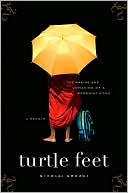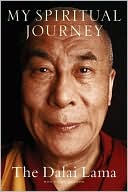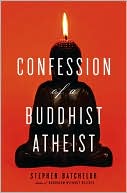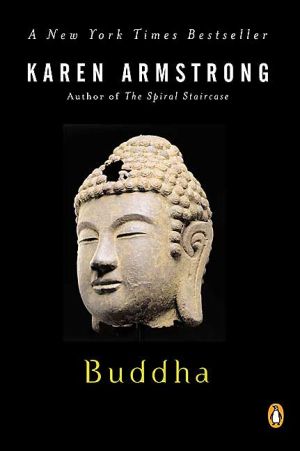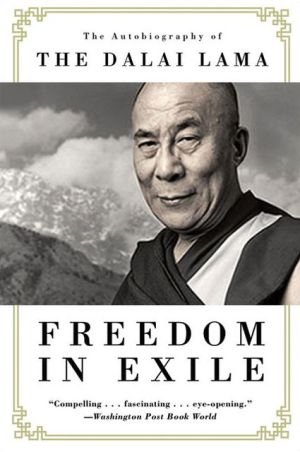Wisdom of Forgiveness
This is the extraordinary documentation of the evolving friendship between the Dalai Lama and the man who followed him across Ireland and Eastern Europe, on a pilgrimage to India's holy sites, and through the Dalai Lama's near fatal illness. On this remarkable journey Victor Chan was awarded an insight into His Holiness-his life, his fears, his faith, his compassion, his day-to-day practice-that no one has reported before. We've heard the public voice of His Holiness—now we are invited to...
Search in google:
The great leader as we've never seen him before. This is the extraordinary documentation of the evolving friendship between the Dalai Lama and the man who followed him across Ireland and Eastern Europe, on a pilgrimage to India's holy sites, and through the Dalai Lama's near fatal illness. On this remarkable journey Victor Chan was awarded an insight into His Holiness-his life, his fears, his faith, his compassion, his day-to-day practice-that no one has reported before. We've heard the public voice of His Holiness—now we are invited to listen in on his personal explorations, and to take instruction on the Tibetan art of living. Publishers Weekly "Do you hate the Chinese?" Chan asked the Dalai Lama when they first met in India in 1972. It was a live question, since Chan hailed from the country that had forced the Tibetan spiritual leader into exile and subjugated the Tibetan people. The Dalai Lama replied immediately with the English word "no," then stated through an interpreter that he had forgiven the Chinese and did not blame China's people. Drawing on Buddhist principles, this book loosely discusses His Holiness's ideas on forgiveness, though Chan presents them gently through stories, not didactically as a step-by-step how-to manual. For example, one chapter arises in the context of the Dalai Lama's travels in war-torn Belfast, where he spoke about forgiveness to the families of victims of terrorist attacks. To research this book, Chan traveled with the Dalai Lama off and on for several years, spent time with him at home and conducted numerous interviews. Apart from the expected teachings on forgiveness, what comes through most clearly is the personality of the Dalai Lama himself: his humor, playfulness and joy. We learn that he had something of a temper as a young man and that he can't resist pulling men's beards. Somehow, the book's serious call to forgiveness becomes all the more engaging and possible because of the Dalai Lama's own lighthearted spirit. One Spirit Book Club alternate. (Aug. 12) Copyright 2004 Reed Business Information.
Introduction : telepathy in the Prague castle11Fu Manchu's goatee152Two monks on the parapet293The man from Derry434A fire in the navel595A most altruistic person756No rubber duckies857Diamonds on the net1018A rifle in the bedroom1139A sea of golden turtles12910A Korean scholar in Bodhgaya14111Some positive, invisible vibrations15312Like molding clay16113The making of a space Yogi17314White kites fluttering18715A couple of unsigned photographs20316All the selfish Buddhas21317The coldness of blueberries22518Meditating to the beeb23719Sophisticated mind, calm mind251
\ From Barnes & NobleThis book is the harvest of dozens of conversations between Tibetan Buddhist leader The Dalai Lama and his friend of three decades Victor Chan. The brief chapters of The Wisdom of Forgiveness serve as lessons, the genial banter of the conversation disguising its spiritual substance. An evening read; lessons for a lifetime.\ \ \ \ \ Publishers Weekly"Do you hate the Chinese?" Chan asked the Dalai Lama when they first met in India in 1972. It was a live question, since Chan hailed from the country that had forced the Tibetan spiritual leader into exile and subjugated the Tibetan people. The Dalai Lama replied immediately with the English word "no," then stated through an interpreter that he had forgiven the Chinese and did not blame China's people. Drawing on Buddhist principles, this book loosely discusses His Holiness's ideas on forgiveness, though Chan presents them gently through stories, not didactically as a step-by-step how-to manual. For example, one chapter arises in the context of the Dalai Lama's travels in war-torn Belfast, where he spoke about forgiveness to the families of victims of terrorist attacks. To research this book, Chan traveled with the Dalai Lama off and on for several years, spent time with him at home and conducted numerous interviews. Apart from the expected teachings on forgiveness, what comes through most clearly is the personality of the Dalai Lama himself: his humor, playfulness and joy. We learn that he had something of a temper as a young man and that he can't resist pulling men's beards. Somehow, the book's serious call to forgiveness becomes all the more engaging and possible because of the Dalai Lama's own lighthearted spirit. One Spirit Book Club alternate. (Aug. 12) Copyright 2004 Reed Business Information.\ \ \ Library JournalIn our day, no spiritual authority from the East has had more to say, or has received more popular acclaim, than the exiled Dalai Lama of Tibet. Despite appearances, this book is less his work than that of his Chinese-born friend Chan, who for more than 30 years has been assembling his recollections and memories of the Tibetan leader. For Chan, the Dalai Lama's gift lies in his understanding of forgiveness: "[Forgiveness] can change one's life." Chan has a good ear for dialog and a sense of scene, and his unobtrusive writing sets the stage for the Dalai Lama's words of peace and compassion. For most collections. Copyright 2004 Reed Business Information.\ \

